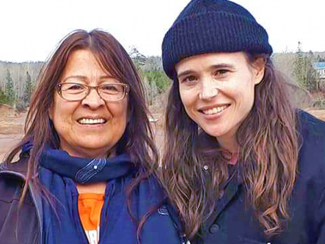STAR EMPOWERED
Ellen Page makes movie to expose environmental racism

Ellen Page (right) with Doreen Bernard, one of the Mi’kmaw grandmothers,
“THE PURPOSE OF GETTING POWER IS TO BE ABLE TO GIVE IT AWAY.” Labour MP Nye Bevan said it in England in the 1950s. Movie star Ellen Page is living it today.
Page is a big-time, acadamy-award-nominated movie star from Nova Scotia, with real “star power”. Enough to give some away. That’s what she hopes to do with her film There’s Something in the Water.
Environmental racism defined, exposed
Page says she wants the film to do two things: first, build support and respect for the women leading three key battles against environmental racism in Nova Scotia; second, wake people up to the power we all have to take charge of our world.
“I hope people feel inspired by these women to go: ‘Shit, I have power, man. I can, and I’m going to use it,” says Page.
“But mostly, I just really want these women to receive the support or the respect that they deserve.
Page explains that environmental racism is the practice of choosing to place landfills and industrial toxic waste disposal sites next to Indigenous and Black communities—a practice that is all-too-common and accepted in Nova Scotia, as well as the rest of Canada and the USA.
Page says the more she read about the reality of active environmental racism in Nova Scotia the more she knew she had to personally do something. Finally, she and two friends simply decided to go out and film the day-to-day reality of it in Nova Scotia. The result is There’s Something in the Water.
Shocking reality
What the film documents is shocking.
In Shelburne, a community that once boasted the highest population of freed black people in North America, the placement of the town dump next to a predominantly Black community in the 1940s has contaminated the drinking water and caused cancer rates to skyrocket.
In Pictou Landing, effluent from a paper mill has destroyed a lake that was used for centuries by the Mi’kmaw people, causing premature deaths that have decimated whole families.
And on the shores of the Shubenacadie River north of Halifax, a First Nations protest group known as the “grassroots grandmothers” is attempting to block Alton Gas from creating a massive natural gas storage facility that will contaminate their local river with brine and chemical agents.
One film reviewer said the many images of environmental devastation in the film “stick to your retina—most of all, that of the furiously polluted Boat Harbour, which now looks like some sort of bubbling, Boschian wasteland from hell. O, Canada.”
Women lead the way
As powerful as those images are, Page says the real impact of the film rests with the women she met. “What’s so powerful about meeting these women and hearing them speak is they’ve embraced their power, says Page. “They know they’re powerful, and they know they can create change. They should be the leaders, and were for thousands of years, Indigenous women.”
Michelle Francis-Denny, community liaison for the Boat Harbour remediation project told hem about the shameful history of how government officials lied to her grandfather, then chief of Pictou Landing First Nation, to get the rights to Boat Harbour so it could be used for pulp effluent.
They also spent time with the grandmothers who are fighting the Alton Gas project. Page describes them as “extraordinary women who give all of themselves to protecting the water and land and the future for all of us.”
“I’m blown away by these women,’ says Page. “ Blown away by who they are, by their conviction, their sincerity, their strength.
“It sounds so overly simplistic to say, but yes, the feeling I get is like deep, deep inspiration that I need to do more, because they do not stop.”
Premier tells Page to butt out
Page made the news in February when she used the Boat Harbour situation to explain environmental racism to Stephen Colbert on his late night network television talk show. She called out the Stephen McNeil government of Nova Scotia for “fast tracking” environmental approvals for the cleanup. McNeil was not impressed. He dismissed Page’s criticism because it came from someone “far away.”
“What a weird thing to say!” says Page. “I was born and raised in Nova Scotia, and graduated high school there and all my family is there. And I’m back there all the time.
“It would be wonderful if Stephen McNeil watched the film. I’d be so grateful if he was open to that. I think he would really benefit from seeing it.”
There’s Something in the Water will be on the film festival circuit this fall, including screenings at the Halifax International Film Festival and the Toronto International Film Festival. The film will also be screened in the three communities featured in the film.
- 30 -













Add new comment